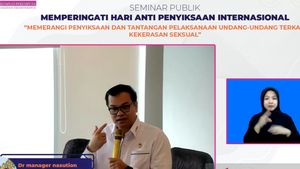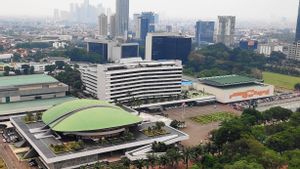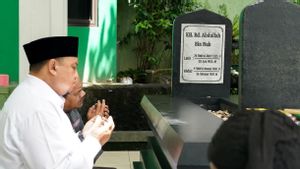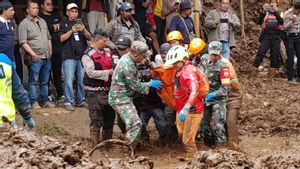JAKARTA - Commission III of the House of Representatives highlighted cases of sexual violence that never subsided. The government is reminded again to immediately issue a derivative rule of Law No. 12 of 2022 concerning the Crime of Sexual Violence (UU TPKS) so that this regulation can be implemented effectively.
"We cannot turn a blind eye to cases of sexual violence in Indonesia, which are currently increasingly rampant, and this must be a common concern," said Member of Commission III of the DPR, Didik Mukrianto, Monday, July 10.
The spotlight of Didik leads to cases of sexual violence among Gunungkidul residents, Yogyakarta Special Region (DIY). Husbands sell their own wives to mashers under the pretext of economic needs. This case was handled by the Solo Police because the arrests took place in the area.
"This case is part of an iceberg phenomenon of acts of sexual violence that has become a scourge in the country. It is very sad and we know that together with cases like this, many cases are actually found in Indonesia," he said.
Didik mengapresiasi Polresta Solo yang menjerat pelaku dengan UU TPKS dan UU no. 21 Tahun 2007 tentang Pemberantasan Tindak Pidana Perdagangan Orang (TPPO) dengan ancaman 12-15 tahun penjara.
"The criminal act of trafficking in persons aimed at sexual expliation is also one of the objects regulated by the TPKS Law. Even further for certain cases, it can be included in the Crime of Human Trafficking and also the Predicate Crime Crime TPPU (Money Laundering)," explained Didik.
Apart from Solo, law enforcement also applies the TPKS Law in cases of sexual violence in Jembarana, Bali. Two middle-aged men were tried for raping a girl with special needs.
The police's steps in the 2 cases are also considered to be a step forward by law enforcement. Because, said Didik, in the field there were still many refusals from police investigators to use the TPKS Law on the grounds that there were no technical rules or implementers.
"The handling of cases by the Solo Police and the Jembarana Police is a step forward from the police who must be followed by other investigators in cases of sexual violence," he said.
The second step of the police is to become a breath of fresh air in the midst of rampant cases of sexual violence. Didik reminded law enforcers that the TPKS Law can already be used to refer to the order of the National Police Chief through Telegram number ST/1292/VI/RES.1.24/2022 which asks all Regional Police Chiefs in Indonesia to order all police institutions in all regions to enforce the TPKS Law.
"There should be no need for police to hesitate to apply the TPKS Law in cases of sexual violence even though there are no technical or implementing regulations, because the regulations in the TPKS Law are clear and operational," he said.
"If so far there is still a lot of reluctance for police investigators to implement the TPKS Law on the grounds that there is no juklak and juknis, then it's time for the police to act more progressively. Don't wait for more victims to fall," continued Didik.
VOIR éGALEMENT:
The legislator from the East Java IX electoral district also regretted that there were still handling cases of protracted sexual violence. Didik gave an example of the alleged case of sexual abuse of male students committed by unscrupulous leaders of Islamic boarding schools in Polewali Mandar (Polman) Regency, West Sulawesi (Sulbar) where in this case, the handling of cases by the police was considered slow.
"Don't forget, in the TPKS Law, police investigators must accept complaints of sexual violence cases. The police must not reject cases of sexual violence for any reason. So the case must be thoroughly investigated immediately even if it involves well-known figures. You cannot be selective," he said.
In addition to law enforcement, the TPKS Law also regulates the right to protection to recovery of victims which includes the right to handling the case. Didik hopes that the police will have a role in accelerating the investigation and investigation process in every case of sexual violence.
"The victim has the right to handling, for example, receiving documents from handling, legal services, psychological strengthening, medical care, and the right to remove electronic-based sexual content involving victims," he explained.
In addition, victims of sexual violence in the TPKS Law also receive protection rights including identity confidentiality and protection from demeaning actions committed by officers handling cases. Then protection for job loss, transfer, education, and political access.
"Meanwhile, the right to recovery includes medical and mental rehabilitation, restitution from perpetrators or compensation from the state, to social reintegration. Recovery is obtained by victims from the process to after the judicial process," said Didik.
Therefore, the DPR invites all parties to contribute to helping prevent acts of sexual violence and guarding their cases. That way, according to Didik, at least cases of sexual violence in Indonesia can be minimized.
"Supervision and participation from the community must be strengthened. Seeing victims of cases of sexual violence continue to fall, apart from taking action, the government must also be extra efforts to prevent it," he said.
"We have to remember that the birth of the TPKS Law is not easy. It takes a long time with a lot of abuse and dynamics. Don't betray the struggle for the birth of the TPKS Law, because this is in the interest of all citizens," concluded Didik.
The English, Chinese, Japanese, Arabic, and French versions are automatically generated by the AI. So there may still be inaccuracies in translating, please always see Indonesian as our main language. (system supported by DigitalSiber.id)

















